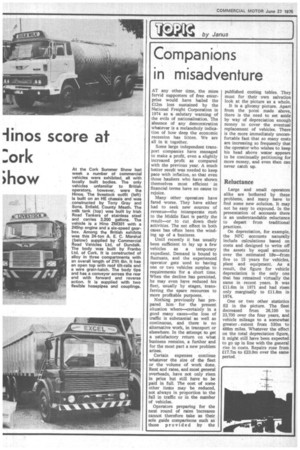Companions in misadventure
Page 22

If you've noticed an error in this article please click here to report it so we can fix it.
AT any other time, the more fervid supporters of free enterprise would have hailed the £12m loss sustained by the National Freight Corporation in 1974 as a salutary warning of the evils of nationalisation. The absence of any demonstration whatever is a melancholy indication of how deep the economic recession has bitten. We are all in it together. • Some large independent transport companies have managed to make a profit, even a slightly increased profit as compared with the previous year. A much better result was needed to keep pace with inflation, so that even those hauliers who have shown themselves most efficient in financial terms have no cause to rejoice.
Many other operators have fared worse. They have either had to seek new sources of revenue—the intemperate rush to the Middle East is partly the result—or to cut down their activities. The net effect in both cases has often been the winding up of a business.
Until recently it has usually been sufficient to lay up a few vehicles as a temporary expedient. Demand is hound to fluctuate, and the experienced operator gets used to having one or two vehicles surplus to requirements for a short time. When the decline has persisted, he may even have reduced his fleet, usually by stages," transferring the spare resources to more profitable purposes.
Nothing previously has prepared him for the present situation where—certainly in a good many cases—the loss of traffic is substantial as well as continuous, and there is no alternative work, in transport or elsewhere. In the attempt to get a satisfactory return on what business remains, a further and for the most part a new problem arises.
Certain expenses continue whatever the size of the fleet or the volume of work done. Rent and rates, and most general overheads, have not only risen in price but still have to he paid in full. The cost of some other items may be reduced, not always in proportion to the fall in traffic or in the number of vehicles.
Operators preparing for the next round of rates increases cannot therefore take as their sole guide comparisons such as those provided by the published costing tables. They must for their own salvation look at the picture as a whole.
It is a gloomy picture. Apart from the point made above, there is the need to set aside by way of depreciation enough money to cover the eventual replacement of vehicles. There is the more immediately uncomfortable fact that so many costs are increasing so frequently that the operator who wishes to keep his head above water appears to be continually petitioning for more money, and even then can never catch up.
Reluctance
Large and small operators alike are bothered by these problems, and many have to find some new solution. It may not be easy to expound. In the presentation of accounts there is an understandable reluctance to depart from traditional practices.
On depreciation, for example, the NFC accounts naturally include calculations based on costs and designed to write off the assets by equal amounts over the estimated life--from five to 15 years for vehicles, plant and equipment. As a result, the figure for vehicle depreciation is the only one that has remained virtually the same in recent years. It was 611.6m in 1971 and had risen only marginally to £11.8m in 1974.
One or two other statistics fill in the picture. The fleet decreased from 26,100 to 23,700 over the four years, and vehicle mileage to a somewhat greater. extent from 530m to 488m miles. Whatever the effect on the total depreciation figure, it might still have been expected to go up in line with the general rise in costs. Repairs rose from 617.7m to 623.9m over the same period.




















































































